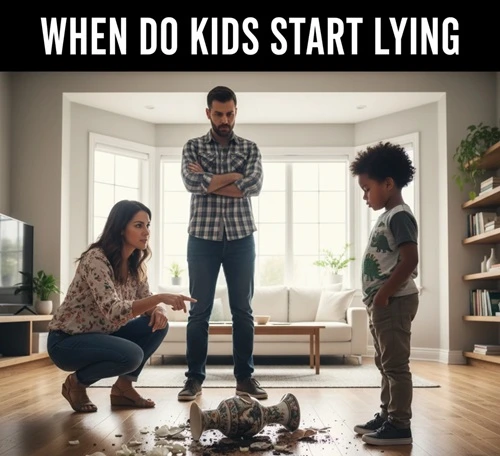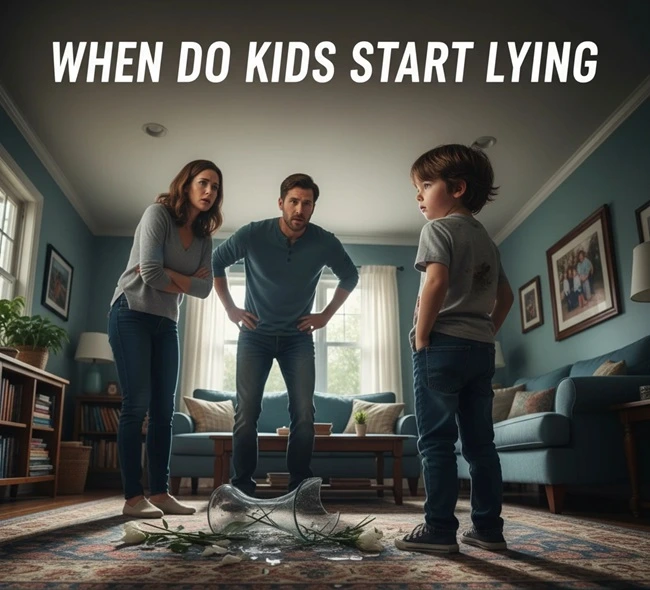Let’s be honest — every parent has been there.
You ask your child a simple question, and the answer sounds a little too perfect. “Did you finish your homework?” “Yes, of course!” they reply… even though the school bag still hides untouched notebooks.
That sinking feeling? The worry that maybe your child is turning into a habitual liar? You’re not alone.
In fact, psychologists say almost 90% of children try lying at some point during their development — and surprisingly, it’s often not because they’re “bad kids.” It’s because they’re learning. They’re learning how truth works, how consequences feel and how adults react when honesty gets uncomfortable.
But what happens when those small fibs start becoming frequent — when your child lies about everything from homework to homework marks, from who broke the glass to whether they brushed their teeth?
Should you be worried? Is this a red flag, or just a phase?
Take a deep breath, parent — this guide is here to help you decode it all.
In this comprehensive blog, written with insights from child psychologists, behavioural experts and real parent experiences, we’ll explore:
- Why kids lie (and what it actually means developmentally)
- When lying becomes a problem
- How to gently but effectively correct the habit
- The art of teaching honesty without shame or fear
- Proven strategies to build lasting trust in your home
Because let’s face it — the goal isn’t to raise a child who never lies, it’s to raise one who chooses honesty, even when it’s hard.
So, if you’ve ever caught your child lying and felt angry, confused or even helpless — keep reading. By the end of this blog, you’ll not only understand why it happens, but you’ll know exactly what to do next — with empathy, wisdom and confidence.

1. Why Kids Lie: The Why Behind the “Why”
First things first – lying in kids is often developmentally normal. Multiple studies in child psychology show that children begin telling untruths at very early ages, sometimes as young as 2–3 years old.
Let’s break down the key reasons.
A. To avoid punishment or consequences
When a child fears a consequence, they may choose to lie rather than face what they believe will be harsh punishment. The organisation American Academy of Child & Adolescent Psychiatry (AACAP) states that this is one of the most common motivations.
B. To get what they want
Children may say something untrue because they believe it will give them access to something—extra screen time, sweets or simply avoiding doing their homework.
C. To protect someone’s feelings or avoid conflict
As empathy grows, children (especially older ones) sometimes lie to avoid hurting someone else or to protect themselves from emotional discomfort.
D. Because they’re testing limits or exploring fantasy
Young children, particularly preschoolers, often blur fantasy and reality. Their “lie” may not be malicious—it might simply be part of their imaginative play, testing what they can say and what happens.
E. Linked to cognitive/developmental factors
Research shows that lying is tied to children’s developing theory-of-mind, inhibitory control and executive function (i.e., the mental capacity to regulate behaviour, understand others’ beliefs, and manage choices).
Bottom line: A child’s lie does not automatically mean there’s something deeply wrong—often it’s a natural part of growing, thinking, experimenting. Rather than panic, it’s an opportunity to guide and teach.
2. Should You Worry If Your Child Lies?
Short answer: Not always. Long answer: It depends on frequency, intent and pattern.
When it’s likely not a big issue
- Occasional lies from younger children (4–6 years) who may be mixing up fantasy and reality.
- Lies that seem impulsive, without a broader pattern of deception.
- Situations where the child feels fearful of consequences and chooses the “easy” route of lying.
When you should pay closer attention
- If the child lies persistently across many situations—homework, chores, interactions with friends—so that “lying” becomes the default.
- If the lies are elaborate, repetitively used as a strategy rather than an occasional slip.
- If the lying seems to be linked with other behavioural issues like defiance, aggression, significant anxiety, or avoidance.
- If you notice a pattern of lying that seems to go beyond mis-impression and into deception or manipulation.
In these cases, it’s worth reflecting – Is there a deeper issue (low self-esteem, fear of failure, attention-seeking, trauma, etc.)? The article from the Child Mind Institute suggests when lying becomes frequent and serious, parents may need to shift from a simple “you must tell the truth” message to a deeper investigation: Why is the child lying?
As parents, your role becomes one of gentle detective and teacher – explore motive, context and emotional landscape—not simply punish.
3. When Lying Becomes “Every Time” for Everything: What Should Be Done?
If you’re noticing the pattern: “My child lies every time, about everything” — then here’s what you should do:
A. Reflect on your environment and responses
- Ask yourself – What happens after the lie? Are punishments so harsh that the child fears telling the truth? Research shows that a punitive environment can encourage lying, because children learn that truth means trouble.
- Consider – Do you create a space where truth is valued more than perfection? If children feel they must always cover up mistakes, lying becomes their safety net.
B. Create a two-part approach: address behaviour + teach underlying skill
Address behaviour:
- Be consistent: If a lie is discovered, respond calmly and reasonably. Avoid labelling the child as “a liar” — this can damage self-esteem and identity.
- Apply natural/appropriate consequences: If the child lied about homework, the consequence is finishing it (not extra chores entirely unrelated). Focus on repairing trust.
- Help child understand why lying happened: “What made you say that?”
- Teach self-regulation, impulse control, honesty as value.
- Build trust so the child feels safe telling the truth—even if it means admitting a mistake.
- Model honest behaviour yourself. Children emulate. If you lie “just this once” it sends a mixed message.
C. Rebuild trust and communication
- Promote open dialogue. Let child know that you value truth more than being right all the time.
- Affirm when they do tell the truth: “Thank you for telling me even though it was hard.”
- Reframe mistakes as learning opportunities.
- Keep an eye on your tone: reacting with rage or shame can shut down future honesty.
D. Seek outside help if needed
If lying is entrenched and accompanied by other issues (e.g., ADHD, anxiety, conduct problems), consult a child psychologist or paediatrician. Sometimes consistent lying is a symptom of underlying difficulties rather than purely willful behaviour.
4. Teaching Right & Wrong About Lying: How to Frame the Conversation
From a parent’s perspective, teaching honesty isn’t about forcing truth—it’s about cultivating integrity. Here’s how to do it:
A. Define what truth means in your family
Start with a simple, clear conversation:
- “We believe in telling the truth, even when it’s uncomfortable.”
- Explain: “Telling a lie can break trust. Trust once broken takes time to rebuild.”
- Use age-appropriate language: with younger children focus on “telling what really happened,” with older children introduce “intentional falsehood.”
B. Use stories and examples
Children respond well to real-life or fictional examples:
- “Remember when you told me you finished your homework but didn’t? I felt worried because I trust you to tell me honestly.”
- Use stories (books, media) about characters making mistakes and being honest, then discuss: “What would you have done?”
- Encourage reflection: “How might the other person feel if we weren’t truthful?”
C. Teach them the why behind honesty
Go beyond “Don’t lie” to “Here’s why telling truth matters”
- Builds trust: Others rely on you and you rely on yourself.
- Protects friendships: If you lie, people may stop trusting you.
- Peace of mind: You don’t have to remember your lies or worry about being caught.
- Self-respect: Being honest helps you respect yourself.
Research finds children’s views of lying shift as they get older: younger children may see lying as simply “wrong,” but older ones begin to understand intent, consequences and social context.
D. Role-play and practise
- With younger kids: Play a “tell the truth game” — ask simple questions, talk about what happens if we lie.
- With pre-teens: Use scenarios: “You broke your sibling’s toy, what do you say?”
- Encourage them to verbalise: “I made a mistake. I broke the toy. I’m sorry.”
E. Positive reinforcement, not shame
- Praise honesty: “I appreciated you telling me what really happened even though you knew you might be in trouble.”
- Avoid labelling: Don’t say “you’re a liar.” Instead say: “That was a lie, but I’m glad you told the truth when you did.”
- Focus on growth: “That was hard, you did the right thing by telling the truth.”
5. Helping Kids Understand Consequences of Lying
Teaching consequences isn’t about punishment—it’s about natural outcomes, logical follow-through and repairing.
A. Consequences that make sense
- If a child lies about doing their chores, the consequence is: go back and do the chores (rather than unrelated punishment) plus talk about why you value honesty.
- If they lied to a friend, help them repair that relationship (apologise, explain).
- Consequences should be predictable, fair and proportionate.
B. Real-world examples and discussion
- Ask: “What happens if someone can’t trust you because you lied? How would you feel if someone lied to you?”
- Let’s talk about the ripple effect: small lies can lead to bigger issues of trust; trust once eroded takes time to rebuild.
- Share age-appropriate stories of trust being broken and consequences.
C. Encourage accountability
- Mistakes happen. Lying compounds them. Encourage the child: admit mistake → apologise → fix what you can.
- Emphasise: “Facing the consequence is brave; hiding from it makes it worse.”
- With older kids: discuss longer-term consequences — damaged reputation, strained friendships, self-image, habit formation.
D. Reflect on the positive outcome of telling truth
- “When you told me what really happened about the spilled juice, we cleaned it up together, and it didn’t turn into a big fight.”
- Reinforce that honesty often leads to smoother resolution, greater trust, less fear.
6. What You Should Not Do: Common Pitfalls to Avoid
A. Avoid reacting with anger or shame
If your first response to catching a lie is rage, you risk shutting down truth-telling. Studies show that punishments alone often backfire and increase lying.
B. Don’t label your child as “a liar”
Identity matters. If a child internalises “I am a liar,” they may behave accordingly. Better to label the behaviour—not the child.
C. Avoid traps or contradictions
If you ask questions you already know the answer to, the child may feel ambushed and become defensive. Better: “I noticed this happened—can you tell me what happened in your words?”
D. Ignoring the lie altogether (when it’s part of a pattern)
Occasional lies might be fine, but persistent lying should not be swept under the carpet. Do not assume “they’ll grow out of it” if there’s a pattern of deceit, avoidance or manipulation.
7. Age-Wise Guide: How to Tailor Your Response
Early childhood (2–5 years)
- Lies are often part of fantasy play or developing sense of self.
- Approach: Calmly correct the statement, help distinguish fantasy vs reality, praise when truth is told.
- Focus: “Thanks for telling me what really happened.”
Middle childhood (6–10 years)
- Children understand the difference between truth and lies more clearly; lying often to avoid trouble or gain something.
- Approach: Discuss motives (“What made you say that?”), set clear expectations, logical consequences, positive reinforcement for honesty.
- Start discussions about trust and its value.
Pre-teen & teen years (11+)
- Lying may be tied to peer pressure, independence, protecting privacy, or self-image.
- Approach: Open, respectful conversation. Don’t “police” every detail. Foster environment where truth-telling is easier than hiding. Talk about long-term trust, character, consequences beyond immediate.
- Encourage self-reflection.
8. Long-Term Impact: Why It Matters
Honesty isn’t just a nice-to-have. It’s foundational for lifelong trust, integrity, and healthy relationships. The behavioural patterns your child forms now can stay into adulthood.
- Children who habitually lie may struggle with relationships, employment and reputation.
- On the flip side, children who learn honesty and integrity build stronger self-esteem, better relationships and more resilience when they make mistakes.
One study on children’s lying behaviour found that their moral evaluations of lying were significantly related to whether they actually confessed or lied—so how children think about lying influences behaviour.
As a parent, you’re not just curbing a “bad habit”—you’re helping build the child’s character, moral compass and self-image.
9. Practical Daily Tips for Parents
- Establish family rules about honesty: “In this house, we tell the truth, even when it’s hard.”
- Use catch-up time: At dinner or before bed, ask open questions “Tell me something that happened today, good or bad.”
- Model honesty: When you make a mistake, admit it to your child. “I forgot to respond to your text—I’m sorry.”
- When you catch a lie: stay calm, discuss what happened, guide the child through telling the truth and repairing if needed.
- Celebrate truth-telling: Acknowledge the courage it takes to tell the truth.
- Manage consequences logically and consistently.
- Build emotional safety: Let your child know that telling truth won’t destroy your love for them.
- Keep perspective: Occasional lies aren’t a crisis—patterns are what matter.
- If in doubt: seek professional input (child psychologist, counsellor) especially if lying is part of a larger behavioural pattern.
10. Final Thoughts
It’s natural to feel uneasy when your child lies—it touches on trust, honesty, values you hold dear. But remember this – lying can be a signal—not always of failure, but of growth, of testing limits, of fear to face consequences, or simply of cognitive development.
Your job as a parent isn’t just to “stop lying” — it’s to teach truth-telling, integrity and trust. It’s to create an environment where being honest feels safer than hiding. It’s to guide your child to understand the why of truthfulness and the costs of deception—without shame, without anger and without eroding their self-worth.
Trust in the process. With patience, clarity, consistency and compassion, you can steer your child toward honesty as a default—not by threat or shame, but by understanding, modelling, valuing and enabling.
You’ve got this.
For more Parenting Tips, Follow Popnewsblend.com

Hi, I’m Prashant Jain — a curious soul, storyteller, and content creator at heart.I’ve always been drawn to the world of entertainment, travel, sports, health & lifestyle — not just as a writer, but as someone who genuinely lives these experiences. Whether I’m binge-watching the latest OTT series, exploring offbeat spiritual destinations in India, or diving deep into wellness routines and cricket match insights, I love sharing what I discover with like-minded readers.
PopNewsBlend is my way of blending personal journeys with meaningful stories — ones that inform, inspire, and keep you ahead of the curve. Everything I write comes from real observations, hands-on experiences, and a deep passion for understanding the world around us.
Discover more from Popnewsblend
Subscribe to get the latest posts sent to your email.








Your point of view caught my eye and was very interesting. Thanks. I have a question for you.